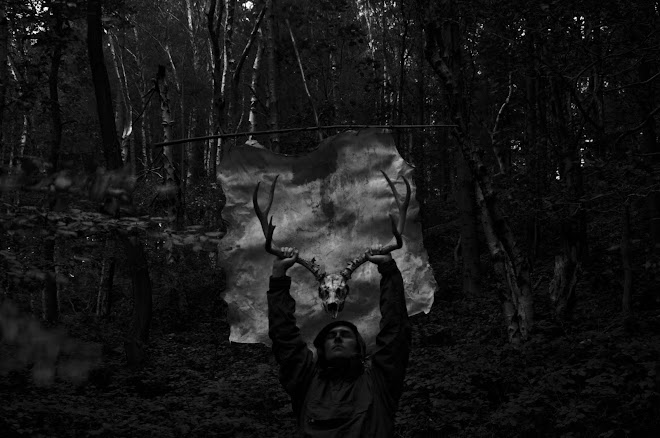


The Anglo-Saxon poem The Wanderer preserves in its grim verse a deep melancholia and profound sense of isolation, loss and weariness. This is not a battle song of sword-kin and spear-bearers, of glory and heroism. It is the cautionary tale of an old man defeated in battle long ago, a landless, lordless vagabond travelling the frost-bound roads of this Middle-Earth vainly seeking for solace, companionship and purpose.
Although a work from post-conversion England The Wanderer runs with heathen signs and symbols. The beasts of Battle – Eagle, Raven and Wolf who glut on the fallen and the dread fear of the oath-breaker lie heavy on the text. Tolkien, who was familiar with the poem, places lines from The Wanderer in Aragorn’s song of Rohan beginning "Where now the horse and the rider? Where is the horn that was blowing?". We know that Aragorn has wandered far, even into the far lands of Rhun and Harad where the stars are strange, and that he has also been forced to forsake hall and hearth and kinsmen. Whilst for Aragorn there is hope (estel), for the wanderer there is little.
This version of the poem is by Michael J. Alexander and is taken from his 1983 edition of Old English Literature. The more experienced scholar may find fault with this translation but what little it lacks in technical skill it makes up for with the epic poetic spirit that it gives to the text.
Often the lone-dweller waits for favour,mercy of the Measurer, though he unhappyacross the seaways long time muststir with his hands the rime-cold sea,tread exile-tracks. Fate is established!
So the earth-stepper spoke, mindful of hardships,of fierce slaughter, the fall of kin:Oft must I, alone, the hour before dawnlament my care. Among the livingnone now remains to whom I daremy inmost thought clearly reveal.I know it for truth: it is in a warriornoble strength to bind fast his spirit,guard his wealth-chamber, think what he will.Weary mind never withstands fate,nor does troubled thought bring help.Therefore, glory-seekers oft bind fastin breast-chamber a dreary mind.So must I my heart--often wretched with cares, deprived of homeland,far from kin--fasten with fetters,since long ago earth coveredmy lord in darkness, and I, wretched,thence, mad and desolate as winter,over the wave's binding sought, hall-dreary, a giver of treasure, where far or nearI might find one who in mead-hallmight accept my affection, or on me, friendless,might wish consolation, offer me joy.He knows who tries it how cruel is sorrow,a bitter companion, to the one who has fewconcealers of secrets, beloved friends. The exile-track claims him, not twisted gold,his soul-chamber frozen, not fold's renown.He remembers hall-warriors and treasure-taking, how among youth his gold-friendreceived him at the feast. Joy has all perished!So he knows, who must of his lord-friend,of loved one, lore-sayings long time forgo.
When sorrow and sleep at once togethera wretched lone-dweller often bind,it seems in his mind that he his man-lordclasps and kisses, and on knee layshands and head, as when sometimes beforein yore-days he received gifts from the gift-throne. When the friendless man awakens again,he sees before him fallow waves,sea-birds bathing, wings spreading,rime and snow falling mingled with hail.Then are the heart's wounds ever more heavy,sore after sweet--sorrow is renewed--when memory of kin turns through the mind;he greets with glee-staves, eagerly surveyscompanions of men. Again they swim away!Spirits of seafarers bring but seldomknown speech and song. Care is renewedto the one who frequently sendsover the wave's binding, weary, his thought.
Therefore, I know not, throughout this world,why thought in my mind does not grow darkwhen the life of men I fully think through,how they suddenly abandoned the hall,headstrong retainers. This Middle-Earth each of all days so fails and fallsthat a man gains no wisdom before he is dealthis winters in the world. The wise man is patient,not too hot-hearted, nor too quick tongued,nor a warrior too weak, nor too foolhardy,neither frightened nor fain, nor yet too wealth-greedy,nor ever of boasts too eager, before he knows enough.A warrior should wait when he speaks a vow,until, bold in mind, he clearly knowswhither mind's thought after will turn. A wise man perceives how ghastly it will bewhen all this world's weal desolate stands,as now here and there across this Middle-Earthblown on by wind walls standcovered with rime, the buildings storm-shaken.The wine-halls moulder, the wielder lies downdeprived of rejoicing, warband all fallen,
proud by the wall. Some war took utterly,carried on forth-way; one a bird bore offover the high holm ; one the frost-wolfdealt over to death, one a warrior,drear-faced, hid in an earth-cave.Thus the Shaper of men destroyed this earth-yard,until, lacking the cries, the revels of men,old giants' work stood worthless.
When he with wise mind this wall-stoneand this dark life deeply thinks through,the wise one in mind oft remembers afarmany a carnage, and this word he speaks:Where is the horse? Where the young warrior? Where now the gift-giver?Where are the feast-seats? Where all the hall-joys?Alas for the bright cup! Alas byrnied warrior!Alas the lord's glory! How this time hastens,grows dark under night-helm, as it were not!Stands now behind the dear warbanda wondrous high wall, varied with snake-shapes,warriors fortaken by might of the ash-spears,corpse-hungry weapons--famous that fate--and this stone-cliff storms dash on;snowstorm, attacking, binds all the ground,tumult of winter, when the dark one comes,night-shadow blackens, sends from the northrough hailstorm in anger toward men.All is the earth-realm laden with hardship,fate of creation turns world under heaven.Here goldhoard passes, here friendship passes,here mankind passes, here kinsman passes:all does this earth-frame turn worthless! So said the one wise in mind, at secret conclaves sat him apart.Good, he who keeps faith, nor too quickly his grieffrom his breast makes known, except he, noble, knows how beforehandto do cure with courage. Well will it beto him who seeks favour, refuge and comfort, from the All-Father in heaven, where all fastness stands.



















